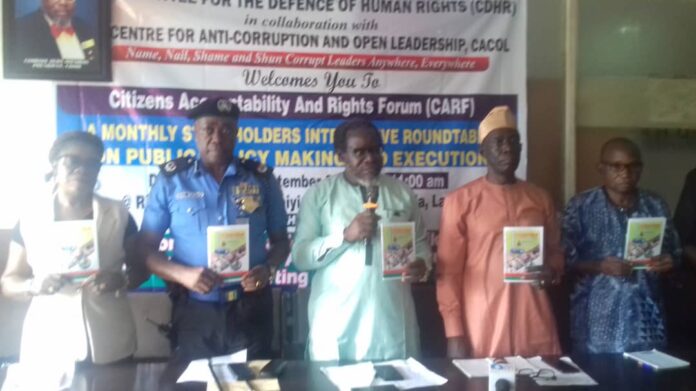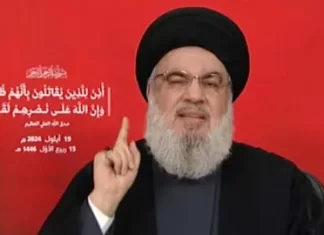By Onyewuchi Ojinnaka
“When the head is right, the whole body will be right and there will be no corruption.” This was the expression of the Assistant Commissioner of Police (ACP) Paul 0kafor, Area ‘F’ Commander, Lagos Police Command who represented the Commissioner of Police (CP) at the 7th edition of stakeholder’s interactive roundtable session on public policy making and execution held in Ikeja, Lagos last Thursday.
The interactive roundtable session with theme; “Fighting Corruption in a Complex Society like Nigeria: Deficiencies in Public Awareness of Corruption Reporting System” was organised by the Committee for the Defence of Human Rights (CDHR) in collaboration with Centre for Anti-corruption and Open Leadership (CACOL)
Speaking on the theme of the interactive session , ACP Okafor said the fight against corruption is a collective fight and not just the police alone.
“We are all working towards making Nigeria a greater nation”
He said the Inspector General of Police is completely against corruption and have zero tolerance for corruption.
“If there is no giver, there will be no taker” Therefore to curb corruption, there should be no giver. We must all fight corruption to have a better nation.
Also speaking at the forum, a representative of the Independent Corrupt Practices and Other Related Offences Commission
(ICPC), an Assistant Commissioner in the anti corruption agency Mrs Barry said ICPC is not relenting in the fight against corruption. She expressed that corruption is abuse of trusted power to private/personal gains and therefore any such abuse is looked into strictly by ICPC.
According to Mrs Barry, ICPC mandate includes investigation, prosecution and prevention. “We do system review. We go to ministries, parastatals to review their financial spending”
She highlighted the effects of corruption to include high unemployment rate, dwindling revenue needed for government work especially in the area of provision of social amenities, lack of patronage for government/public schools and low trust of citizens in the law and rule of law.
Mrs Barry outlined the government’s effort to curb corruption, by enacting criminal and penal code, establishment of anti-graft agencies, NDLEA, the Money Laundering Act, etc.
In its sensitisation and prevention activities, ICPC has set up units to expose the wrong doings in ministries, parastatals. The units can investigate and report but they cannot prosecute.
Speaking on padding, the ICPC Assistant Commissioner said that padding is a corrupt act, noting that it is not only in the National Assembly but in government and private offices.
She said that the challenges in the fight against corruption is lack of political will from the society, the policy makers and self discipline, adding that ” if you don’t say No to corruption, then the society will suffer for it. We should fight against corruption collectively”
Earlier in his opening address the President of CDHR/Chairman of CACOL Comrade Debo Adeniran welcomed the participants to the 7th edition of the stakeholder’s roundtable session.
“This event provides a forum for healthy exchanges of ideas so that the areas of friction between the government and the governed would be drastically reduced if not totally eliminated because the people would have sense of belonging and the government would have the opportunity of listening to the people and explaining their positions on diverse policy issues that may crop up at a particular time.
We are convinced that this will definitely bring about harmonious relationship between the government and the governed.
He noted that It is a known fact that Nigeria’s endemic corruption is the country’s greatest challenge to its stability despite several anti-graft efforts from the government, which raises questions about the Nigerian institutions’ ability to tackle corruption. “That is why we would beam our searchlight on corruption in the country with the theme, ‘Fighting Corruption in a Complex Society like Nigeria: Deficiencies in Public Awareness of Corruption Reporting System’.
“We would like to explore the different angles to the efforts of the government at fighting corruption in the country and how well members of the public are knowledgeable in reporting corruption crimes to the appropriate authorities.
“It would be highly impossible to discuss this important topic without the input of the representatives of the prominent Anti-Graft Bodies in the country talking about the Economic and Financial Crimes Commission (EFCC) and the Independent Corrupt Practices and Other Related Offences Commission (ICPC).
“Corruption is an anti-social attitude awarding improper privileges contrary to legal and moral norms and impairs the authorities’ capacity to secure the welfare of all citizens. Corruption in Nigeria is a constant phenomenon. In 2012, Nigeria was estimated to have lost over $400 billion to corruption since its independence.
“According to Wikipedia, the rise of public administration and the discovery of oil and natural gas are two major events believed to have led to the sustained increase in the incidence of corrupt practices in the country.The government has made efforts to minimize corruption through the enactment of laws and the enforcement of integrity systems, but with little success. Greed, ostentatious lifestyle, customs, and people’s attitudes are believed to have led to corruption.
Comrade Adeniran pointed out that another root cause is tribalism. He said friends and kinsmen seeking favor from officials can impose strains on the ethical disposition of the official as these kinsmen see government officials as holding avenues for their survival and gain.
The idea of focusing on issues of national importance, policies and activities and gathering people to discuss it, is anchored on our determination to ensure that the common man on the street is not short changed by government policies and encourage an all-embracing, all-inclusive implementation of government’s policies so as to enhance the socio-economic wellbeing of the people of the State.
“At this stage, it is important to state that CDHR and CACOL’s activities have for long been funded with subscriptions and donations from affiliates, members and patrons. It is on this basis that we are soliciting your support for the organizations.
“We would like to do more in the service of humanity and we are ready to partner with relevant government agencies and fraternal organizations to ensure that we continue to be the voice for the hapless citizens of the country as a whole”.
The highlight of the event was the presentation/ launching of ‘CITIZENS FORUM ‘ a publication of the proceedings of Citizens Accountability and Rights Forum, published by CDHR/CACOL .












